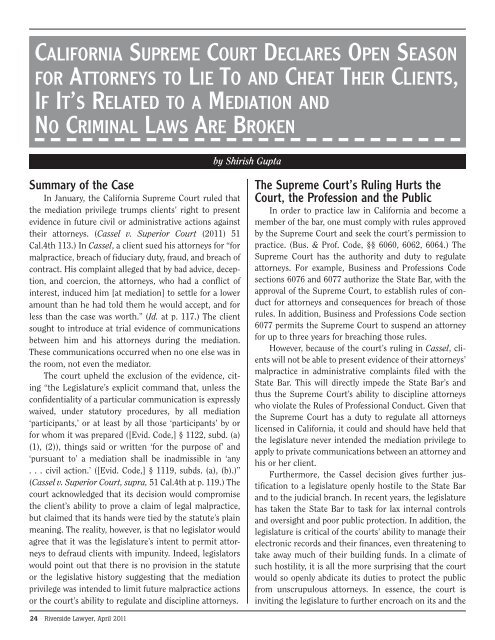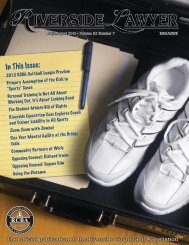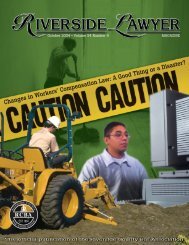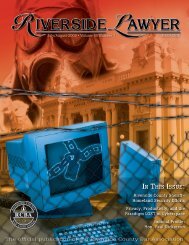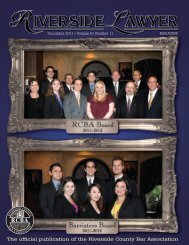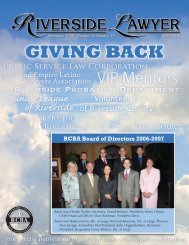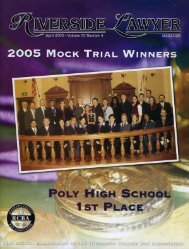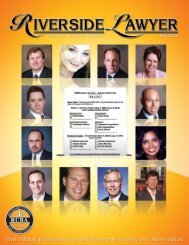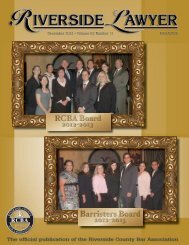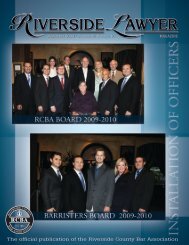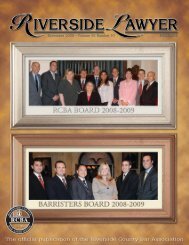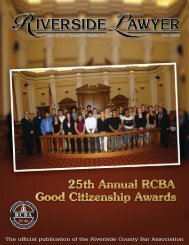2011 Mock Trial - Riverside County Bar Association
2011 Mock Trial - Riverside County Bar Association
2011 Mock Trial - Riverside County Bar Association
You also want an ePaper? Increase the reach of your titles
YUMPU automatically turns print PDFs into web optimized ePapers that Google loves.
California Supreme Court Declares Open Season<br />
for Attorneys to Lie To and Cheat Their Clients,<br />
If It’s Related to a Mediation and<br />
No Criminal Law s Are Broken<br />
by Shirish Gupta<br />
Summary of the Case<br />
In January, the California Supreme Court ruled that<br />
the mediation privilege trumps clients’ right to present<br />
evidence in future civil or administrative actions against<br />
their attorneys. (Cassel v. Superior Court (<strong>2011</strong>) 51<br />
Cal.4th 113.) In Cassel, a client sued his attorneys for “for<br />
malpractice, breach of fiduciary duty, fraud, and breach of<br />
contract. His complaint alleged that by bad advice, deception,<br />
and coercion, the attorneys, who had a conflict of<br />
interest, induced him [at mediation] to settle for a lower<br />
amount than he had told them he would accept, and for<br />
less than the case was worth.” (Id. at p. 117.) The client<br />
sought to introduce at trial evidence of communications<br />
between him and his attorneys during the mediation.<br />
These communications occurred when no one else was in<br />
the room, not even the mediator.<br />
The court upheld the exclusion of the evidence, citing<br />
“the Legislature’s explicit command that, unless the<br />
confidentiality of a particular communication is expressly<br />
waived, under statutory procedures, by all mediation<br />
‘participants,’ or at least by all those ‘participants’ by or<br />
for whom it was prepared ([Evid. Code,] § 1122, subd. (a)<br />
(1), (2)), things said or written ‘for the purpose of’ and<br />
‘pursuant to’ a mediation shall be inadmissible in ‘any<br />
. . . civil action.’ ([Evid. Code,] § 1119, subds. (a), (b).)”<br />
(Cassel v. Superior Court, supra, 51 Cal.4th at p. 119.) The<br />
court acknowledged that its decision would compromise<br />
the client’s ability to prove a claim of legal malpractice,<br />
but claimed that its hands were tied by the statute’s plain<br />
meaning. The reality, however, is that no legislator would<br />
agree that it was the legislature’s intent to permit attorneys<br />
to defraud clients with impunity. Indeed, legislators<br />
would point out that there is no provision in the statute<br />
or the legislative history suggesting that the mediation<br />
privilege was intended to limit future malpractice actions<br />
or the court’s ability to regulate and discipline attorneys.<br />
The Supreme Court’s Ruling Hurts the<br />
Court, the Profession and the Public<br />
In order to practice law in California and become a<br />
member of the bar, one must comply with rules approved<br />
by the Supreme Court and seek the court’s permission to<br />
practice. (Bus. & Prof. Code, §§ 6060, 6062, 6064.) The<br />
Supreme Court has the authority and duty to regulate<br />
attorneys. For example, Business and Professions Code<br />
sections 6076 and 6077 authorize the State <strong>Bar</strong>, with the<br />
approval of the Supreme Court, to establish rules of conduct<br />
for attorneys and consequences for breach of those<br />
rules. In addition, Business and Professions Code section<br />
6077 permits the Supreme Court to suspend an attorney<br />
for up to three years for breaching those rules.<br />
However, because of the court’s ruling in Cassel, clients<br />
will not be able to present evidence of their attorneys’<br />
malpractice in administrative complaints filed with the<br />
State <strong>Bar</strong>. This will directly impede the State <strong>Bar</strong>’s and<br />
thus the Supreme Court’s ability to discipline attorneys<br />
who violate the Rules of Professional Conduct. Given that<br />
the Supreme Court has a duty to regulate all attorneys<br />
licensed in California, it could and should have held that<br />
the legislature never intended the mediation privilege to<br />
apply to private communications between an attorney and<br />
his or her client.<br />
Furthermore, the Cassel decision gives further justification<br />
to a legislature openly hostile to the State <strong>Bar</strong><br />
and to the judicial branch. In recent years, the legislature<br />
has taken the State <strong>Bar</strong> to task for lax internal controls<br />
and oversight and poor public protection. In addition, the<br />
legislature is critical of the courts’ ability to manage their<br />
electronic records and their finances, even threatening to<br />
take away much of their building funds. In a climate of<br />
such hostility, it is all the more surprising that the court<br />
would so openly abdicate its duties to protect the public<br />
from unscrupulous attorneys. In essence, the court is<br />
inviting the legislature to further encroach on its and the<br />
24 <strong>Riverside</strong> Lawyer, April <strong>2011</strong>


